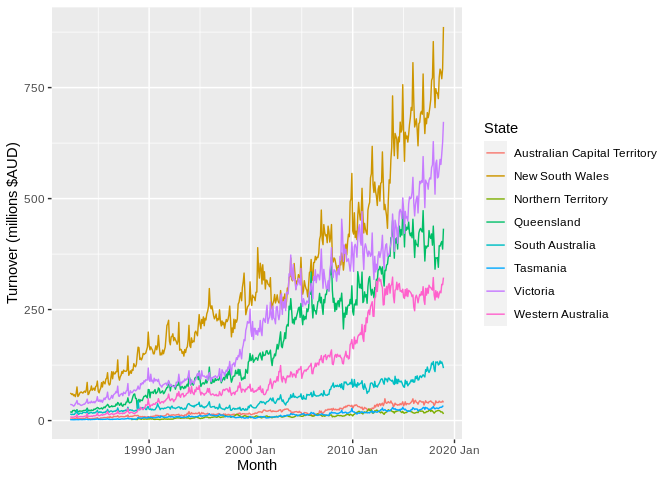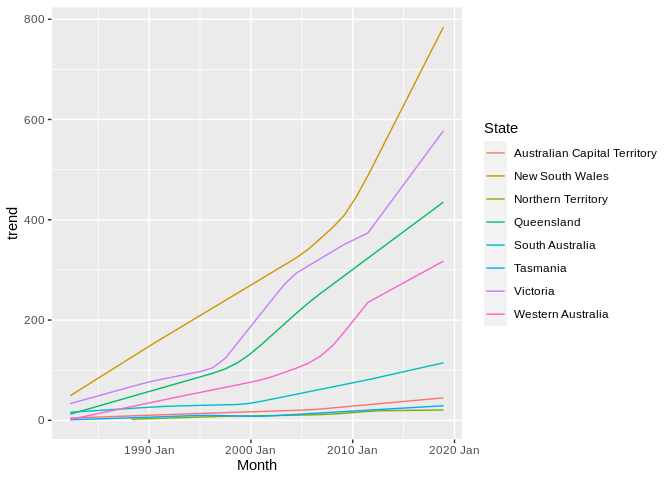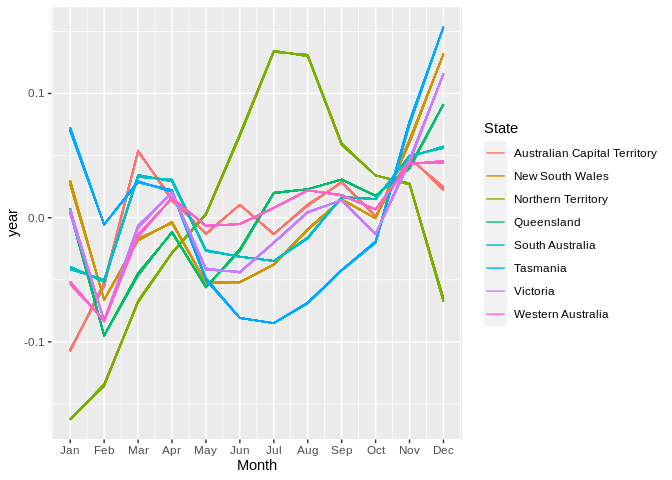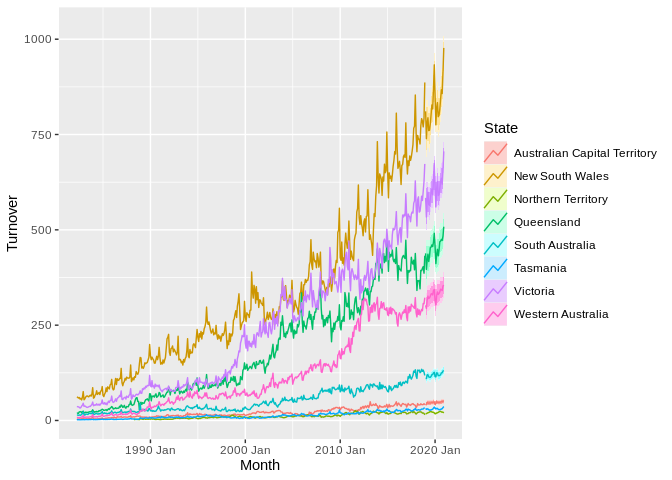
This package provides a tidy R interface to the prophet forecasting procedure using fable. This package makes use of the prophet package for R.
You can install the development version of fable.prophet from Github with:
Suppose we wanted to model Australia’s monthly turnover for cafes, restaurants and catering services. The data is available from the Australian Bureau of Statistics catalogue 8501.0, and in the tsibbledata package.
library(tsibble)
library(dplyr)
cafe <- tsibbledata::aus_retail %>%
filter(Industry == "Cafes, restaurants and catering services")
Each series generally exhibits an increasing trend with an annual seasonal pattern that varies proportionally to the level of the series. At a monthly level, any holiday effects can be modelled using a seasonal term. A piecewise linear trend is included by default, and so it is not included in the model specification below.
library(fable.prophet)
#> Loading required package: Rcpp
#> Loading required package: fabletools
fit <- cafe %>%
model(
prophet = prophet(Turnover ~ season("year", 4, type = "multiplicative"))
)fit
#> # A mable: 8 x 3
#> # Key: State, Industry [8]
#> State Industry prophet
#> <chr> <chr> <model>
#> 1 Australian Capital Territory Cafes, restaurants and catering servic… <prophet>
#> 2 New South Wales Cafes, restaurants and catering servic… <prophet>
#> 3 Northern Territory Cafes, restaurants and catering servic… <prophet>
#> 4 Queensland Cafes, restaurants and catering servic… <prophet>
#> 5 South Australia Cafes, restaurants and catering servic… <prophet>
#> 6 Tasmania Cafes, restaurants and catering servic… <prophet>
#> 7 Victoria Cafes, restaurants and catering servic… <prophet>
#> 8 Western Australia Cafes, restaurants and catering servic… <prophet>The above output confirms that this Prophet model has been fitted to each of the time series. Components from this model can be extracted:
components(fit)
#> # A dable: 3,456 x 10 [1M]
#> # Key: State, Industry, .model [8]
#> # Prophet Decomposition: Turnover = trend * (1 + multiplicative_terms) +
#> # additive_terms + .resid
#> State Industry .model Month Turnover additive_terms multiplicative_… trend
#> <chr> <chr> <chr> <mth> <dbl> <dbl> <dbl> <dbl>
#> 1 Aust… Cafes, … proph… 1982 Apr 4.4 0 0.0149 4.45
#> 2 Aust… Cafes, … proph… 1982 May 3.4 0 -0.0131 4.51
#> 3 Aust… Cafes, … proph… 1982 Jun 3.6 0 0.0104 4.57
#> 4 Aust… Cafes, … proph… 1982 Jul 4 0 -0.0131 4.63
#> 5 Aust… Cafes, … proph… 1982 Aug 3.6 0 0.00993 4.69
#> 6 Aust… Cafes, … proph… 1982 Sep 4.2 0 0.0287 4.76
#> 7 Aust… Cafes, … proph… 1982 Oct 4.8 0 0.00122 4.82
#> 8 Aust… Cafes, … proph… 1982 Nov 5.4 0 0.0480 4.88
#> 9 Aust… Cafes, … proph… 1982 Dec 6.9 0 0.0239 4.94
#> 10 Aust… Cafes, … proph… 1983 Jan 3.8 0 -0.106 5.00
#> # … with 3,446 more rows, and 2 more variables: year <dbl>, .resid <dbl>

Note that the annual seasonal pattern does not change very quickly, although it does differ slightly between years. A very differently seasonal pattern can be seen for the Northern Territory. We can also produce forecasts for each of these series over the next two years.
#> # A fable: 192 x 6 [1M]
#> # Key: State, Industry, .model [8]
#> State Industry .model Month Turnover .mean
#> <chr> <chr> <chr> <mth> <dist> <dbl>
#> 1 Australian Capit… Cafes, restaurants and … proph… 2019 Jan sample[1000] 40.1
#> 2 Australian Capit… Cafes, restaurants and … proph… 2019 Feb sample[1000] 42.7
#> 3 Australian Capit… Cafes, restaurants and … proph… 2019 Mar sample[1000] 47.6
#> 4 Australian Capit… Cafes, restaurants and … proph… 2019 Apr sample[1000] 46.2
#> 5 Australian Capit… Cafes, restaurants and … proph… 2019 May sample[1000] 45.1
#> 6 Australian Capit… Cafes, restaurants and … proph… 2019 Jun sample[1000] 46.3
#> 7 Australian Capit… Cafes, restaurants and … proph… 2019 Jul sample[1000] 45.4
#> 8 Australian Capit… Cafes, restaurants and … proph… 2019 Aug sample[1000] 46.5
#> 9 Australian Capit… Cafes, restaurants and … proph… 2019 Sep sample[1000] 47.7
#> 10 Australian Capit… Cafes, restaurants and … proph… 2019 Oct sample[1000] 46.4
#> # … with 182 more rows